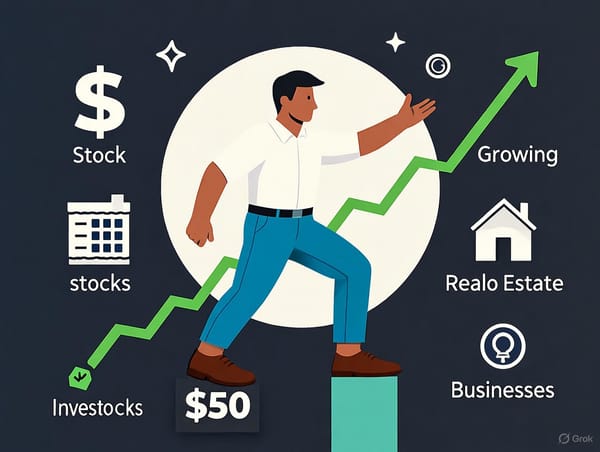The Power of Compounding
Compounding transforms small, consistent efforts into extraordinary results over time, turning modest beginnings into monumental outcomes in wealth, health, or skills.

Compounding is often described as a quiet force, one that works behind the scenes, gradually transforming small, consistent efforts into extraordinary results. Whether it's building wealth, improving your health, or mastering a skill, the principle of compounding rewards patience and persistence. In this article, we'll explore how this invisible wealth hack can turn modest beginnings into monumental outcomes, drawing parallels to everyday processes that mirror this phenomenon.
Why Compounding Feels Invisible
At its core, compounding is about small, repeated actions that build upon themselves over time. Imagine starting a fitness routine. The first few workouts might leave you sore and discouraged, with no visible changes in the mirror. Similarly, when you begin saving or investing, the initial returns might seem insignificant—barely enough to notice. This early stage is where most people falter. The lack of immediate results can make the effort feel futile, tempting you to abandon the process.
However, just as a seedling buried in soil takes time to break through the surface, the early stages of compounding are about laying a foundation. Each small action—whether it’s a workout, a deposit, or a study session—sets the stage for future growth. The key is to keep going, even when the progress isn’t immediately apparent.
The Magic of Exponential Growth
The true power of compounding reveals itself over time. In finance, this is often illustrated through the concept of compound interest. When you invest a small amount and earn interest, that interest begins to earn interest of its own. Over years, this cycle of reinvestment creates exponential growth. For example, a modest investment of $1,000 at a 7% annual return could grow to over $7,600 in 30 years, without adding a single extra dollar. This is the magic of compounding: small inputs, consistently applied, lead to outsized results.
This principle isn’t limited to money. In personal development, regular practice compounds into expertise. A writer who commits to 500 words a day may not notice improvement in a week, but over months and years, their skill sharpens dramatically. The same applies to relationships, habits, or any area where consistent effort accumulates.
Why Time Matters
Compounding requires one critical ingredient: time. The longer you allow your efforts to build, the more dramatic the results. This is why starting early is so powerful. In investing, someone who begins saving at 25 will see far greater returns by 65 than someone who starts at 35, even if they save the same amount. The extra decade allows the compounding effect to work its magic.
However, time alone isn’t enough. Discipline is equally crucial. Just as a gardener must water and nurture a plant, you must consistently contribute to your goals. Skipping workouts, neglecting savings, or abandoning habits disrupts the compounding process, delaying or diminishing the results.
Overcoming the Temptation to Quit
The biggest challenge with compounding is staying the course. In the early days, when progress feels slow, it’s easy to question whether your efforts are worth it. This is where mindset comes in. Instead of focusing on immediate outcomes, shift your perspective to the long game. Every dollar saved, every skill practiced, every step forward is an investment in a future payoff that’s bigger than you can currently see.
To stay motivated, track your progress in small ways. Celebrate milestones, like the first $1,000 saved or the first month of sticking to a routine. These markers remind you that the process is working, even if the big results are still on the horizon.
Practical Steps to Harness Compounding
- Start Small, Start Now: Whether it’s saving $10 a week or practicing a skill for 15 minutes a day, begin with manageable steps. The key is consistency, not size.
- Stay Consistent: Set up systems to make persistence easier, like automatic savings plans or scheduled practice sessions.
- Leverage Time: The earlier you start, the more time compounding has to work. Don’t wait for the “perfect” moment.
- Reinvest Gains: In investing, reinvest dividends or interest. In personal growth, use what you’ve learned to push further.
- Be Patient: Trust the process. Results may take months or years, but they will come if you don’t give up.
Build Your Future, One Step at a Time
Compounding is like planting a tree. At first, all you see is dirt, but with care and time, it grows into something remarkable. Whether you’re building wealth, health, or skills, the secret lies in consistent, small actions that accumulate over time. Embrace the slow start, stay disciplined, and let compounding work its magic. Years from now, you’ll look back and marvel at how far those small steps have taken you.





